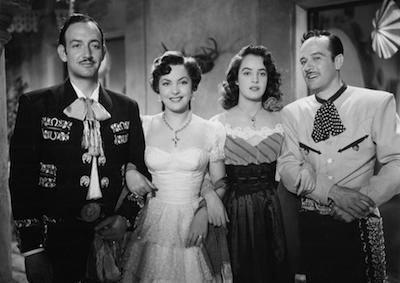Note: this double feature also screens Nov. 3 at the Downtown Independent.
Dos tipos de cuidado (Mexico, 1953)
Two old friends break up when one marries the girlfriend of the other. A key example of the comedia ranchera genre, Dos tipos de cuidado is the only film in which legendary Mexican film stars Pedro Infante and Jorge Negrete appear together. Capitalizing on their popularity as Mexico’s most famous singing charros, the film stages a famous musical duel between the two, in which they trade clever insults and double entendres. Despite the onscreen romantic rivalry between them (a staple of the comedia ranchera), the two stars supposedly decided to appear in the film together to refute rumors of their mutual animosity off-screen. Both Infante and Negrete had a loyal following in Los Angeles. In fact, Negrete’s untimely death in 1953 occurred in Los Angeles, where he was scheduled to appear at the Million Dollar. Curiously, the film was produced by Miguel Alemán Jr., son of the Mexican president in office at the time. —Colin Gunckel
Dos viejos amigos dejan de hablarse cuando uno de ellos se casa con la novia del otro. Dos tipos de cuidado es uno de los máximos exponentes de la comedia ranchera y la única película en la que los míticos Pedro Infante y Jorge Negrete trabajaron juntos. Aprovechando que ambos eran los charros cantantes más famosos de México, la película incluye un famoso duelo musical en el que Infante y Negrete intercambian insultos sutiles y frases repletas de dobles sentidos. A pesar su rivalidad en la pantalla (algo típico en las comedias rancheras), al parecer las dos estrellas decidieron realizar esta película para disipar los rumores de su enemistad fuera de la pantalla. Tanto Infante como Negrete tenían muchos seguidores en Los Ángeles. De hecho, en 1953 Negrete falleció prematuramente en Los Ángeles, donde tenía programado aparecer en el Million Dollar. Curiosamente, la película fue producida por Miguel Alemán Jr., hijo del presidente de México. (trans. Roberto Green)
Print courtesy of Filmoteca de la UNAM. 35mm, b/w, 123 min. In Spanish with English subtitles. Producer: Cinematográfica Tele-Voz. Director: Ismael Rodríguez. Producer: Miguel Alemán Jr., David Negrete. Screenwriter: Ismael Rodríguez, Carlos Orellana. Cinematographer: Gabriel Figueroa. Cast: Jorge Negrete, Pedro Infante, José Elías Moreno, Carmen González.
Una familia de tantas (Mexico, 1949)
A door-to-door salesman comes to the house to hawk an American vacuum cleaner, convincing the daughter of the household that the machine will improve their lives. However, because the daughter received the salesman without a chaperon, a traditional Mexican family is thrown into turmoil. Things get worse when the salesman announces to the pater familias that he plans to marry the daughter. Alejandro Galindo, who trained with Hollywood director Gregory La Cava at the beginning of the sound period, serves up a melodrama about the clash between Mexican family and religious values and the postwar intrusion of American-style modernity. As the English translation of the title, “A family like many others,” indicates, this middle class Mexican family symbolizes a cultural shift away from traditional European values towards American consumerism, and the generational conflicts engendered by that shift. —Jan-Christopher Horak
Un vendedor a domicilio acude a una casa con la intención de vender un aspirador norteamericano. Allí convence a la hija de la familia de que el electrodoméstico mejorará sus vidas. Sin embargo, el hecho de que la hija recibiese al vendedor sin estar acompañada crea un gran revuelo en la tradicional familia mexicana. Todo empeora cuando el vendedor anuncia al padre que pretende casarse con su hija. Alejandro Galindo, que se había formado con el director hollywoodense Gregory La Cava en los comienzos del cine sonoro, ofrece un melodrama sobre el conflicto que surge entre los valores familiares y religiosos mexicanos y la llegada de la modernidad norteamericana en la posguerra. Como indica el título, la familia de clase media de la película representa el cambio cultural que hubo de los valores europeos tradicionales hacia el consumismo norteamericano, y los conflictos generacionales que este cambio ocasionó. (trans. Roberto Green)
DCP, b/w, 130 min. In Spanish with English subtitles. Production: Producciones Azteca. Director: Alejandro Galindo. Screenwriter: Alejandro Galindo. Cinematographer: José Ortiz Ramos. Editor: Carlos Savage. Cast: Fernando Soler, David Silva, Martha Roth, Carlos Riquelme, Eugenia Galindo.






 Mobile Navigation
Mobile Navigation

